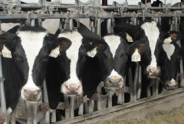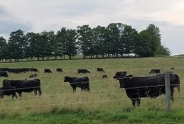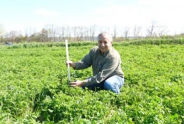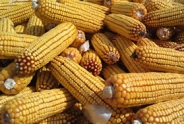Novel Coronavirus Prevention & Control
Ashley McFarland, Area Livestock Specialist
Central New York Dairy and Field Crops
Novel Coronavirus Prevention & Control for Farms
The U.S. is confronting an outbreak of a novel coronavirus that causes serious respiratory disease and may be deadly for older people and those with weakened immune systems. The World Health Organization is now calling the outbreak a global pandemic because it is affecting countries all over the world. People and organizations can still fight coronavirus by taking steps to prevent transmission of the disease, the whole point of widespread cancellation of events is to create "social distancing" to lower the infection rate and prevent health care systems from being overwhelmed. New York State Department of Health has a Coronavirus Website with English and Spanish posters for preventing coronavirus infection (https://health.ny.gov/diseases/communicable/coronavirus/). The U.S. Centers for Disease Control and prevention (CDC) provides clear guidance about preventing infection in both English and Spanish. They also provide a number of printable factsheets and posters in English and Spanish suitable for use in the workplace. (Download at: https://www.cdc.gov/coronavirus/2019-ncov/communication/factsheets.html) Employer Actions Steps Your farm workforce is not immune to coronavirus, please begin taking steps to protect yourself and your employees.
- Talk with your employees about coronavirus, how it spreads, and how to prevent getting infected.
- Print the CDC factsheets and posters, post in your workplace and employee housing facilities.
- Provide guidance to help employees clean and disinfect employer-provided housing. Follow up with employees and manage the process to be sure that this happens. Set up a regular weekly and daily schedule for cleaning.
- CDC guidance for cleaning homes: https://www.cdc.gov/coronavirus/2019-ncov/community/home/cleaning-disinfection.html
- Clean and disinfect your workplace. The employee breakroom and bathroom are great places for virus to be transmitted. Clean and disinfect any areas where employees congregate or routinely touch items such as doorknobs and computer keyboards. Set up daily and weekly cleaning schedules.
- Provide cleaning supplies such as cleaning solutions, buckets, mops, brushes, etc for cleaning at work and for those living in employer-provided housing. (CDC list of approved antimicrobial cleaning products: https://www.epa.gov/sites/production/files/2020-03/documents/sars-cov-2-list_03-03-2020.pdf)
- Review your sick leave policy. The first advice for people who are sick is to stay home except to get medical care. Do you provide paid sick leave for your employees? If you do not, will employees feel financially obligated to come to work even if they are sick?
- Communicate with employees that they should stay home if they are sick. Employees sometimes come to work believing they will face punishment or firing if they miss work. Be sure your employees understand that their health and that of their co-workers' comes first. Communicate and make a plan to cover for sick employees. CDC provides posters in English and Spanish covering symptoms of novel coronavirus.
- Prepare your disaster contingency plan. What will you do if 50% of your employees become sick and unable to work? Are there neighboring farms who might be able to share resources in an emergency? Who will manage for a few weeks if you or another key manager are unable to leave your house or are hospitalized?
Cornell provides the Extension Disaster Education Network (EDEN) to provide community education resources across the entire disaster cycle of preparedness, response, and recovery.
Penn State also provides farm disaster preparedness resources.
At minimum, share the guidelines below from New York state with your employees and family. New York State Department of Health Prevention Tips
While there is currently no vaccine to prevent this virus, these simple steps can help stop the spread of this and other respiratory viruses:
- Wash your hands often with soap and water for at least 20 seconds. If soap and water are not available, use an alcohol-based hand sanitizer.
- Avoid touching your eyes, nose and mouth with unwashed hands.
- Avoid close contact with people who are sick.
- Stay home when you are sick.
- Cover your cough or sneeze with a tissue, then throw the tissue in the trash.
- Clean and disinfect frequently touched objects and surfaces.
To see the whole article, see: http://agworkforce.cals.cornell.edu/2020/03/12/novel-coronavirus-prevention-control-for-farms/?fbclid=IwAR31dANSe_cOqifqWqr6nSh-n2utShLE8WHu1Hwl1WrBdhf0FOQA8t9XiGU _________________________________________________________________________________ By Richard Stup, Cornell University. Permission granted to repost, quote, and reprint with author attribution. The post Novel Coronavirus Prevention & Control for Farms appeared first in The Ag Workforce Journal
Upcoming Events
Fresh Cow Health Disorders - Spanish
July 19, 2024
July 26, 2024
August 2, 2024
August 9, 2024
August 16, 2024
August 23, 2024
August 30, 2024
Free webinar series in Spanish.
Calving Workshop
August 6, 2024 : Calving Workshop
Herkimer, NY
English / Spanish program. Limited to 8 English speaking & 8 Spanish speaking participants. Lunch included.
Announcements
Document and Share Storm Damage
Mother nature has really been difficult over the last few days. Significant damage has been seen throughout NYS. Please let us know what types of damage your farm may have sustained during this time. This could be in the form of property damage, lost power, milk dump due to lost power, loss of livestock, loss of stored feed or growing crops.Farms are encouraged to DOCUMENT AND SHARE any impacts the weather may have had on their home or business. This could include structure damage, crop loss, inventory loss due to power outages, damage to equipment or fencing, and more.
If your farm experienced any sort of damage, please reach out to any of the folks listed below (or all of them). The more impact information that is collected, the greater the likelihood of a disaster declaration which can bring vital emergency support and awareness. The CNYDLFC Team will continue to collect detail and submit to NYSDAM and the EDEN network.
Reporting Weather Related Impacts (For your home or farm business)
- First, ensure that all the people and animals on your farm are safe, and that there aren't any unsafe working conditions created because of the weather (check your structures!). If there's an emergency, call 911 - don't try to manage it all on your own.
- Second, document all negative weather impacts for your farm and their estimated financial cost. Take photos, make estimates, and put it all in a safe place.
- Reach out to your insurance providers - farm, vehicle, crop, etc. to initiate the claim process as needed.
- Then, share your farm's damage with any (or all) of the ag support agencies listed below. We all work together to collect storm damage information and funnel it up to Ag and Markets which can initiate a natural disaster declaration.
- Chenango: 607-334-5841
- Fulton/Montgomery: 518-853-2135
- Herkimer: 315-866-7920
- Madison: 315-684-3001
- Otsego: 607-547-2536
- Schoharie: 518-234-4303
- Saratoga: 518-885-8995
- Nicole Tommell: 315-861-6001
- Erik Smith: 315-219-7786
- Daniela Gonzalez: 315-749-3486
- Ashley McFarland- 315-604-2156
Your county USDA/FSA service center.
- Chenango: 607-334-3231
- Fulton/Montgomery: 518-853-4015
- Herkimer: 315-866-2520
- Madison:315-824-9076
- Otsego: 607-547-8131
- Schoharie: 518-295-8600
- Saratoga: 518-692-9940
Your county farm bureau manager
- Region 3: Bailey Coon: 518-937-0566
- Region 5: John Wagner: 315-761-9770
- Region 6: Natally Batiston: 518-937-0269
- Region 7: Todd Heyn: 518-431-9338
Please let us know how we can help you.
Cash Rent and Custom Harvest Survey
To date, there is limited information available about rental rates and fees for crop harvesting. Farms can use this valuable information for their farm business planning to help improve decision making and profitability.Farmers Can Join MeatSuite For Free!
MeatSuite.com is a free resource provided by Cornell University where NY meat farmers can create a farm profile and list their bulk (wholes, halves, quarters) and bundled (i.e. Grilling Bundle) meat products.Why should farmers join?
1. It's free and easy!
2. Connect with more local customers. In the past year the MeatSuite.com farm directory had 8,300 visits from New York consumers. Farm profiles get as many as 25 views per month from potential local customers. We also spotlight MeatSuite farms on social media and bring attention and purchases to farms through highlights and giveaways.
How do I join?
Farmers can visit https://www.meatsuite.com/farmers/ to create a free farm profile. You must list at least one product for your farm's profile to go live. You'll also have access to Cornell's free Meat Price Calculator, a helpful tool for pricing your meat to make a profit.
While you're on MeatSuite, check out the "Creating Consumer-Friendly Bulk Meats" publication on the log-in page. It has tips on how to create bulk meat products that are easier for first-time buyers to say "yes" to.
If you have any questions as you create your farm profile or products, we're here to help! Please email Matt LeRoux at mnl28@cornell.edu.




